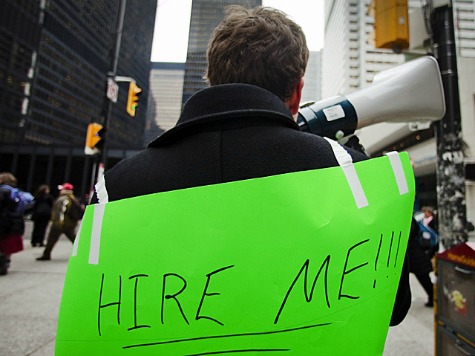
A new study from the Center for Immigration Studies found that 57.5 million working-age Americans are either unemployed or currently out of the labor market, a figure that matches what some estimate to be the number of immigrant workers that would be brought into the country by the Senate’s “Gang of Eight” immigration bill.
“The number of working-age (16 to 65) native-born Americans who are not working — unemployed or out of the labor market — stood at 57.5 million in the second quarter of 2013, a figure that has barely budged in the last three years,” CIS’s Steven Camarota wrote. “Partly on the grounds that there are not enough workers in the United States, the Gang of Eight Immigration bill (S.744) that recently passed the Senate would double future legal immigration.”
“Yet the more than 57 million working-age natives not working is 17 million larger than in the second quarter of 2000,” Camarota explained. “The large increases in future legal immigration in S.744 seem out touch with the realities of the U.S. labor market.”
According to Senate Budget Committee ranking member Sen. Jeff Sessions (R-AL), the Senate bill would bring in 57 million new workers to compete with those out-of-work Americans for jobs that are already scarce in President Barack Obama’s lagging economy.
On a conference call with reporters announcing that estimate of 57 million new workers in May, Sessions said that he thinks “this is a matter of humanitarian interest.”
“It’s an important matter, even, of civil rights,” Sessions said then. “The obligation we have as American policymakers in Congress to consider what is in the long-term national interest of America.”
Sessions asked that with approximately “47 million on food stamps, shouldn’t we be working to make sure every single American citizen now dependent on social services of the government be provided with the first opportunity to achieve a good job with a decent pay with a retirement plan and a healthcare plan? That’s got to be our goal.”
Sessions added that while legal immigration is good, the massive and unprecedented increase in numbers during a bad economy would have drastic consequences for out-of-work Americans. “This is a number that exceeds the population of the state of California, our largest state,” Sessions said. “It’s a very, very significant impact on our economy and the American people.”

COMMENTS
Please let us know if you're having issues with commenting.